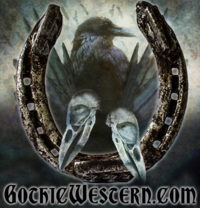With Dead Man, Jim Jarmusch explores demented and supernatural experience of the Western genre. It is the story of a young man’s journey, both physically and spiritually, into very unfamiliar terrain. William Blake (Johnny Depp) travels to the extreme western frontiers of America sometime in the 2nd half of the 19th century. Lost and badly wounded, he encounters a very odd, outcast Native American, named “Nobody”, who believes Blake is actually the dead English poet of the same name. Nobody constantly quotes the poet, like such as “The eagle never lost so much time, as when he submitted to learn of the crow”. Ironically, in the film, Blake does not understand any of what Nobody is saying and calls it “Indian malarkey”. When he asks Blake “Did you kill the man who killed you?” and Blake answers “I’m not dead”, we can assume that Nobody’s knows something Blake doesn’t.
 The story, with Nobody’s help, leads William Blake through situations that are in turn comical and violent. Contrary to his nature, circumstances transform Blake into a hunted outlaw, a killer, and a man whose physical existence is slowly slipping away. Thrown into a world that is cruel and chaotic, his eyes are opened to the fragility that defines the realm of the living. It is as though he passes through the surface of a mirror, and emerges into a previously-unknown world that exists on the other side. Symbolism abounds–there are shooting stars, down-shots of a hellish factory where Blake wanders looking for a way out, mines and factories of “white-man’s metal,” plenty of dead animals, including a small doe that Depp lies down with after decorating his face with its blood.
The story, with Nobody’s help, leads William Blake through situations that are in turn comical and violent. Contrary to his nature, circumstances transform Blake into a hunted outlaw, a killer, and a man whose physical existence is slowly slipping away. Thrown into a world that is cruel and chaotic, his eyes are opened to the fragility that defines the realm of the living. It is as though he passes through the surface of a mirror, and emerges into a previously-unknown world that exists on the other side. Symbolism abounds–there are shooting stars, down-shots of a hellish factory where Blake wanders looking for a way out, mines and factories of “white-man’s metal,” plenty of dead animals, including a small doe that Depp lies down with after decorating his face with its blood.
The hero’s soul is what is at stake, for only after redemption can souls make it into Heaven (unless being a saint whose soul goes straight to Heaven). One could view Dead Man as Blake’s journey through Purgatory to a place that Nobody calls “the next level of worlds” or “the place where all the spirits come from.” The entire voyage through this shadowy world, the real world but a symbolic Purgatory, is an unceasing fight for Blake’s soul.
Blake’s nemesis is played by Lance Henriksen as a cannibalistic bounty hunter. The supporting roles present an assortment of cameos where actors such as Crispin Glover, John Hurt, Billy Bob Thornton and Robert Mitchum (in his last role) appear giving outstanding performances. The guitar score by Neil Young, which at first provides a decent background to the action, soon becomes redundant. Robert Ebert was even more blunt, stating that it “sounds like nothing so much as a man repeatedly dropping his guitar.”
Every night and every morn Some to misery are born. Every morn and every night Some are born to sweet delight. Some are born to sweet delight, Some are born to endless night. We are led to believe a lie When we see not through the eye Which was born in a night to perish in a night, When the soul slept in beams of light. God appears, and God is light To those poor souls who dwell in night, But does a human form display To those who dwell in realms of day.
Get your Criterion copy of Dead Man HERE.



